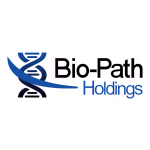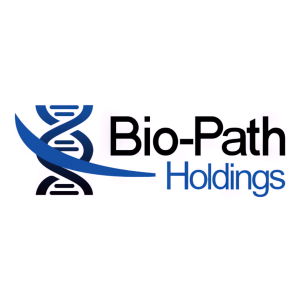Welcome to our dedicated page for Bio-Path Hldgs news (Ticker: BPTH), a resource for investors and traders seeking the latest updates and insights on Bio-Path Hldgs stock.
Bio-Path Holdings Inc (BPTH) is a clinical-stage biotechnology company pioneering targeted therapies using its proprietary DNAbilize® platform, which enhances delivery of nucleic acid-based cancer treatments. This page provides investors and industry professionals with timely updates on BPTH pipeline progress, regulatory milestones, and corporate developments.
Access consolidated news about clinical trial results, partnership announcements, and financial reports in one trusted location. Content spans preclinical advancements, FDA communications, and strategic initiatives shaping the company’s oncology focus.
Key updates include developments in antisense DNA therapeutics for blood cancers and solid tumors, leveraging BPTH’s novel liposomal delivery system. Bookmark this page to efficiently track the company’s progress in advancing precision medicine solutions with improved safety profiles.
Bio-Path Holdings (BPTH) has announced a corporate update conference call and audio webcast scheduled for May 29, 2025, at 8:30 a.m. ET. The company, which specializes in DNAbilize® antisense RNAi nanoparticle technology, will provide a comprehensive business overview during the call.
Bio-Path's pipeline includes several key candidates: prexigebersen (BP1001) in Phase 2 for blood cancers, BP1001-A in Phase 1/1b for solid tumors and obesity treatment, and BP1002 targeting Bcl-2 protein for blood cancers and solid tumors. Additionally, the company plans to file an IND application for BP1003, a STAT3 inhibitor.
Bio-Path Holdings (BPTH) reported financial results for FY2024, highlighting progress in obesity and oncology programs. The company posted a net loss of $9.9 million ($4.12 per share), compared to $16.1 million loss in 2023. Year-end cash position stood at $1.2 million.
Key developments include promising pre-clinical results for BP1001-A in treating obesity in Type 2 diabetes patients, showing enhanced insulin sensitivity in cell models. The company expanded its patent portfolio with new patents in the US and New Zealand, now holding 7 US patents and 61 foreign patents across 26 countries.
Research and development expenses decreased to $7.3 million from $11.6 million in 2023, while general and administrative expenses increased to $4.7 million from $4.2 million. The Phase 1/1b trial of BP1002 for refractory/relapsed AML has advanced to the fourth dose cohort of 90 mg/m2.
Bio-Path Holdings (BPTH) has announced promising pre-clinical results for BP1001-A as a potential treatment for obesity in Type 2 diabetes patients. The studies demonstrated that BP1001-A successfully attenuated fatty acid-induced insulin resistance and restored insulin sensitivity in muscle progenitor and skeletal muscle fiber cell models.
The drug works by downregulating growth factor receptor-bound protein 2 (Grb2) expression to increase insulin sensitivity and help lower blood glucose levels. Recent testing confirmed BP1001-A's effectiveness in both myoblast cells and C2C12 myotubes, particularly in counteracting the insulin resistance caused by palmitic acid, a common saturated fatty acid in high-fat diets.
Bio-Path plans to conduct final pre-clinical testing using a mouse model in the first half of 2025 to assess BP1001-A's impact on animal weight, insulin sensitivity, and glucose tolerance. Upon successful completion, the company aims to file an Investigational New Drug (IND) application in 2025 to initiate a first-in-human Phase 1 clinical trial.
Bio-Path Holdings (NASDAQ:BPTH) has expanded its global patent portfolio with new patents in the United States and New Zealand. The company received Notice of Allowance for U.S. Patent No. 17/339,366 for STAT3 inhibition and New Zealand Patent No. 741793 for liposomal formulation, both related to their DNAbilize® platform technology.
The company's current intellectual property portfolio includes seven issued patents in the U.S. and 61 issued patents in foreign jurisdictions, providing protection in 26 countries. Bio-Path has three pending patent applications in the U.S. and five additional allowed patent applications in foreign jurisdictions.
Bio-Path is developing RNAi nanoparticle drugs, with their lead candidate prexigebersen in Phase 2 for blood cancers, BP1001-A in Phase 1/1b for solid tumors, and BP1002 being evaluated for blood cancers and solid tumors. The company is also preparing an IND application for BP1003, a STAT3 inhibitor.
Bio-Path Holdings (NASDAQ:BPTH) has reported positive updates from two ongoing clinical trials. In the Phase 1/1b BP1001-A solid tumor trial, the first patient treated with the higher dose (90 mg/m2) showed a 15% tumor reduction and maintained stable disease through ten treatment cycles. This elderly female patient with gynecologic cancer had previously failed multiple chemotherapy treatments and surgeries.
In the Phase 2 trial of prexigebersen triple combination therapy for Acute Myeloid Leukemia (AML), two elderly patients have maintained complete remission. The first patient has received 20 cycles over 26 months, while the second has completed 16 cycles over 20 months. The therapy combines prexigebersen with decitabine and venetoclax.
The company's DNAbilize® platform technology demonstrates potential for developing multiple drug candidates for target-specific protein inhibition. The Phase 1b portion will assess BP1001-A's safety and efficacy in combination with paclitaxel for ovarian or endometrial tumors, with additional studies planned for pancreatic cancer treatment.
Bio-Path Holdings (NASDAQ:BPTH) has announced progress in its Phase 1/1b clinical trial of BP1002 for treating refractory/relapsed acute myeloid leukemia (AML). The trial has advanced to the fourth dose cohort of 90 mg/m2, with promising results from the third cohort where a patient showed stable disease and significant blast count reduction after one treatment cycle.
The study targets AML patients, including those resistant to venetoclax, the current standard of care. Notably, venetoclax-resistant patients typically have a median survival of less than 3 months. BP1002's unique approach targets Bcl-2 at the mRNA level, potentially overcoming venetoclax resistance mechanisms.
The trial is being conducted at major U.S. cancer centers, including Cornell University, MD Anderson Cancer Center, Scripps Health, and UCLA Cancer Center. The treatment protocol involves eight doses over 28 days, with plans to commence a combination therapy phase with decitabine after completing the monotherapy cohorts.
Bio-Path Holdings (NASDAQ:BPTH) has provided its 2025 clinical development and operational update, highlighting progress across multiple programs. The company is advancing its DNAbilize® platform in both oncology and a new application for obesity treatment in Type 2 Diabetes patients.
Key developments include: a Phase 2 clinical trial for prexigebersen in acute myeloid leukemia (AML) with three cohorts; an ongoing Phase 1/1b trial of BP1001-A for advanced solid tumors showing positive early results; and a Phase 1/1b trial of BP1002 for relapsed/refractory AML. The company has developed a molecular biomarker package to identify patients more likely to respond to prexigebersen treatment.
Notable progress includes a patient in the BP1001-A solid tumor trial showing a 15% tumor reduction after nine treatment cycles. The company plans to file an IND application for BP1001-A in obesity treatment for Type 2 Diabetes patients later in 2025.


